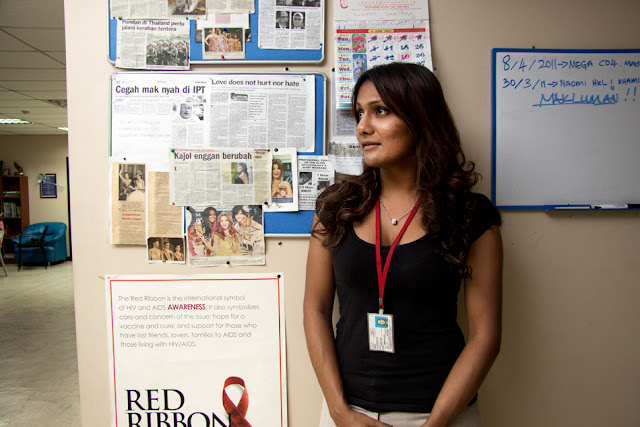Nisha is confident and beautiful, and she is open to speaking about her own painful personal experiences as a Mak Nyah, or male-to-female transsexual, if it helps others find the strength to accept themselves and live their lives fully. Before she begins to recount how she came to PT Foundation, she adjusts her long hair so the curls cascade down her back. Even though she looks glamorous for any office setting, she still hopes that our photographer won’t take any candid photos.
Nisha was arrested in her hometown of Melaka for cross-dressing while spending the day out with a group of friends. Cross-dressing is against sharia (Islamic) law, and a religious officer apprehended her. Subsequently, she was sentenced to a two-month prison term.
“The doors were like Jurassic Park,” Nisha recalls of the intimidating entryway to the prison.
Prison was an even more dangerous and traumatic experience than Nisha could have ever imagined. Sex change operations are banned in Malaysia, but in the months before she was arrested in Melaka, Nisha had gotten breast implants to help her look the way she always felt – like a woman. In prison, her long hair was cut off and she was forced to strip naked and walk in front of the inmates as they made vulgar remarks.
“I will never forget the rows of cells. I was asked to show my breasts to each one. I tried to remain calm, but I was crying on the inside.”
Just for trying to be herself, Nisha was persecuted and sexually abused.
“I kept asking ‘why is this happening to me?’”
A warden offered to guard Nisha from other inmates, but he demanded sexual favors in return. Without other options, Nisha fulfilled his desires in exchange for physical protection.
The only ray of light Nisha felt was when her mother came to visit her in prison and they experienced a breakthrough in their relationship. Seeing the torment Nisha had been put through, her mother finally understood that her child was not choosing this lifestyle, but really felt like a woman on the inside. She accepted Nisha for whom she is and even fulfilled her request to bring a wig for her to wear on the day of her release.
Nisha loves her job in PT Foundation as the program officer for the Transgenders' Program.
After spending two hellish months in jail, Nisha started working in the nightlife industry. While this work provided her with money to pay her bills and more, Nisha still felt deeply unhappy and knew that she wanted other options. She came to PT Foundation to gain a sense of empowerment and to find inspiration from others who had been through similar situations.
PT Foundation influenced her life in such a positive way that she started to volunteer with the organization. Now, six years later, Nisha is the Transgender Program Manager. In her new role, Nisha is able to shape programming and advocacy strategies to combat gender and sexual identity misconceptions. With the rise of boot camps in Malaysia to “correct” effeminate schoolboys, Nisha’s work is essential.
“In Malaysia, transgender people are not recognized. Society doesn’t know about it. They think they can change (effeminate) kids, but they can’t. It just lowers their self-esteem or they run away from home.”
Fortunately, these boys have a support system waiting for them in Kuala Lumpur. They can always turn to Nisha and the PT Foundation for guidance and understanding.
Maria Skouras, The Advocacy Project











